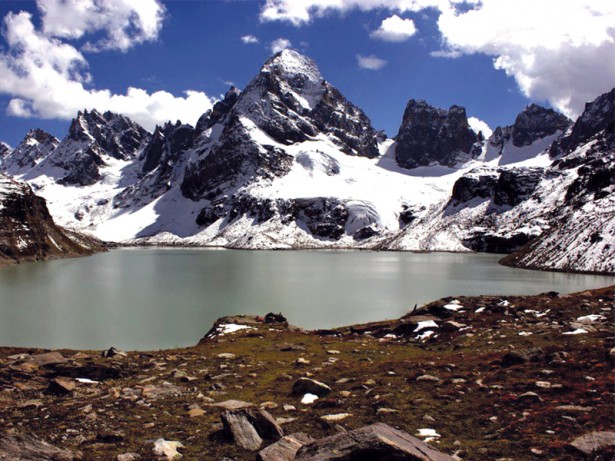
ISLAMABAD: The view from the top of the 5,940-metre Gondogoro Pass must have made Atif Mukhtar and his fellow trekkers forget the fatigue of their trek.
For the final stages of the ascent, they had to wade through waist-high snow. But at the top of the pass, all four 8,000-metre high Karakoram peaks — the K-2, Gasherbaum 1, Gasherbaum 2 and the Broad Peak — stared back, in all their majestic glory, at the 27-member trekking team.
“It is one of the most overwhelming mountain panoramas in the world,” said Mukhtar, a trekker from Islamabad. “We were lucky we got a clear view of the peaks. It was breathtaking,” he added.
The trekking team had scaled the Gondogoro Pass, one of the highest mountain passes in the world, in July 2012.
On Sunday, Mukhtar was one of 150 trekking enthusiasts from across Pakistan who gathered in Islamabad to share their adventures in the country’s northern areas from earlier this year.
Umair Hasan, one of the organisers, explained the idea behind the event: “This is an opportunity to get other trekkers, who might be planning to head to some of the same areas, physically, mentally and financially prepared for their trips,” Hasan said, adding, “It is a platform to share the knowledge and expertise of the trekker community and promote this hobby.”
The meeting, he said, was also a good networking opportunity for like-minded people with the same target destinations for 2013.
Knowledge sharing
Through multimedia presentations and photo slideshows, the trekkers not only recounted their personal experiences of the wilderness but also briefed members of their community on technical details such as trek itineraries, routes and expenditures.
During one presentation, Arshad Iqbal Wani, a geologist and mountain lover originally from Rawalpindi, showed breathtaking images of lakes he claimed were “undiscovered”. Wani said he found around 50 hidden lakes that were not mentioned in any guide books during his exploratory treks in the northern areas.

Shoaib Qaisrani during his presentation; an image shared at the event. PHOTOS: COURTESY ORGANISERS
In another session, Shoaib Qaisrani, a trekker from Islamabad, explained how he and a team of trekkers scaled the Mazeno Pass in the Western Himalayas this year. Qaisrani was especially appreciative of the Chilasi porters, who help trekkers carry tents, equipment and food during the expeditions.
Passion leads the trek
The treks can be expensive — Qaisrani’s team spent Rs30,000 per head for the Mazeno pass trek — and they require time. Technical expertise is also sometimes essential. What is it then that keeps the trekkers going?
“It all depends on the passion,” Dr Ahsan Akhtar, a trekker from Faisalabad, said.
Akhtar, 38, who started trekking back in 1985, said he and others in his generation were mostly inspired by the travelogues written by Mustansir Hussain Tarar.
“When you are passionate about something, you make time for it,” Hasan, who is a software engineer, said. “I get 15 holidays during the year and I spend them trekking.”
Trekkers and tourism
“Pakistan is a land of opportunities for trekkers and mountaineers,” Akhtar said. “Even the base camps of our peaks are at a higher altitude than all the peaks in Europe.”
But Akhtar lamented Pakistan’s miserable tourism industry. He said Pakistan receives only 0.7 million tourists a year, despite the country’s diverse natural landscape. Trekking could be one way Pakistan’s tourism fortunes can be revived, he added.

Tariq Hameed Sulemani, a trekker who said he travelled through the fog to reach Islamabad from near Multan, said the Ministry of Tourism needs to “wake up”.
“We can continue organising our small gatherings, but if the state does not take trekking and tourism under its wing, the tourism industry cannot rise,” Sulemani said.
Another trekker, Amir Saleem, said the foreign tourism has dried up in Pakistan’s northern areas because of the security situation.
“Those areas once thrived with foreign tourists and trekkers,” Saleem said. “We owe the people of the northern areas to revive their tourist economies.”
Calling all trekkers
Technology has made it easier for trekking enthusiasts across Pakistan to stay in touch and plan trekking trips. The event, for example, was organised by a volunteer-based online community who use the Facebook page “Trekking Pakistan” to mobilise trekkers for the event.
“Some of our senior trekkers tell us they used to write letters to find people willing to go to the K-2 base camp back in the day. Some of those letters went unanswered,” Hasan said. “Now because of social media, we know about each other’s trekking plans beforehand,” he added.
The event was the fourth of its kind. It has been held regularly since 2009, Hasan said. Moreover, he remarked that young trekking enthusiasts should start small by hiking the Margalla Hills in Islamabad or arranging short camping trips to Kashmir and Kaghan.
Published in The Express Tribune, December 31st, 2012.
COMMENTS (1)
Comments are moderated and generally will be posted if they are on-topic and not abusive.
For more information, please see our Comments FAQ




































































I must say i was lucky to be one the attendees. Very well deserved applause for the organizers who brought all trekkers enthusiasts under one umbrella. This event doesn't only bring a great sense of achievement to the trekkers who presented their accomplishments of the year but also become motivational for other trekkers to stretch their future endeavors beyond their limits